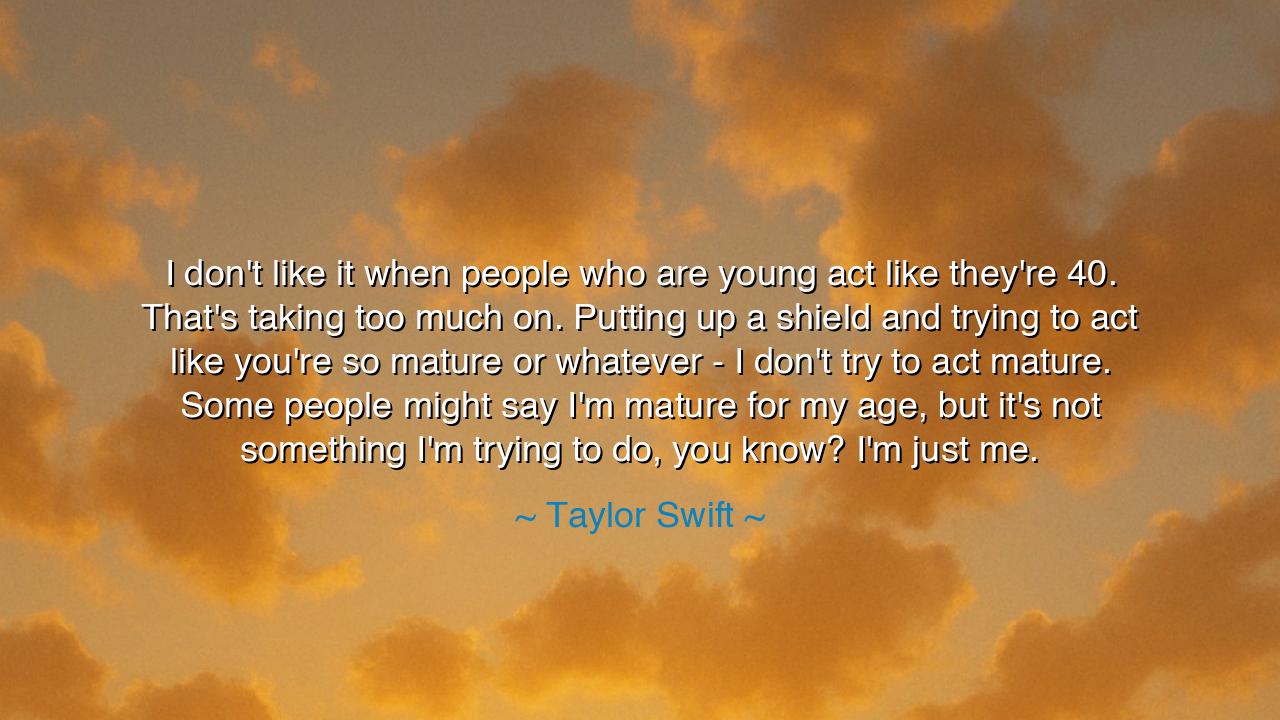
I don't like it when people who are young act like they're 40.
I don't like it when people who are young act like they're 40. That's taking too much on. Putting up a shield and trying to act like you're so mature or whatever - I don't try to act mature. Some people might say I'm mature for my age, but it's not something I'm trying to do, you know? I'm just me.






Harken, O children of the future, to the words of the wise Taylor Swift, who speaks with the clarity of a soul unburdened by pretense: "I don't like it when people who are young act like they're 40. That's taking too much on. Putting up a shield and trying to act like you're so mature or whatever - I don't try to act mature. Some people might say I'm mature for my age, but it's not something I'm trying to do, you know? I'm just me." These words carry a truth that resonates deeply, for they speak not only of the dangers of forced maturity, but of the courage to embrace one’s true self without the weight of artificial burdens.
In every age, there have been those who, at the tender years of youth, sought to appear as if they had already walked the long road of life, trying to cloak themselves in the armor of maturity long before they were ready. These young souls often mistake maturity for a mask—an external shield that hides the raw and unrefined essence of their true being. They believe that to act as if they are older, to carry the baggage of the world, is to earn the respect of others. But, O children, this is a dangerous path. The true essence of youth is not found in the burdens it seeks to bear too soon, but in the freedom it possesses to explore, to stumble, to learn, and to grow into its own.
Take, for example, the story of Alexander the Great, who, at the age of twenty, was crowned King of Macedon. With great ambition, he sought to conquer the world, his youthful energy unmatched by any of his predecessors. Yet, in his quest for power, Alexander often wore the mask of the mature ruler, burdened by the demands of empire-building. He placed upon his young shoulders the weight of a world that he was not yet prepared to govern fully. While his conquests were vast, the desires for glory and control that marked his reign left him little room for the simple joys of youth. Had he been allowed to remain a youth, unburdened by the expectations of greatness, perhaps his legacy would have been less tragic.
What Taylor Swift reminds us in her words is this: maturity is not something to be forced, nor something to be worn like a heavy cloak. It is a process that arises naturally, born of experience, struggle, and the willingness to embrace one’s own journey. It cannot be hurried. Those who try to act as if they are older than they are, to put on a shield of maturity, are often doing so out of fear—fear that they will not be taken seriously, fear that their true selves are not enough. But true strength lies not in pretending to be someone we are not, but in embracing who we are, exactly where we are in life.
Think also of Leonardo da Vinci, whose brilliance was apparent from a young age. Though many around him sought to push him into roles of authority, seeking maturity before his time, da Vinci never allowed his youthful curiosity and playfulness to be overshadowed by the weight of the world. It was his willingness to remain unburdened by the strictures of forced maturity that allowed him to create, to explore, and to develop ideas that would transform the very course of history. He did not try to act as though he were already a master; instead, he focused on the process of learning, growing, and being true to his own path.
In this same way, O children, let us take heed of Taylor Swift’s wisdom. The temptation to act mature, to put on the mask of adulthood before its time, is strong. It is easy to think that by acting older, we will gain the respect of others or avoid the vulnerability of youth. But there is a deeper lesson to be learned here—maturity is not a thing to be hurried. It will come naturally, as we experience the world, face challenges, and grow. But until then, let us embrace the freedom of our own age. Let us not try to be something we are not, but instead, let us be who we are, for it is in that authenticity that we find our true strength.
Therefore, let us celebrate youth and all that it offers—the freedom to explore, to fail, to learn, and to grow without the weight of the world. Let us not rush toward maturity, for it will come in its own time. Instead, let us be present in the moment, embracing our current selves with all the vibrancy and excitement that youth affords. As Taylor Swift says, she does not try to act mature; she is simply herself. Let us take that wisdom into our own hearts, and let the world see us not for the shields we wear, but for the strength we find in our authenticity. And when the time comes for maturity, we will wear it proudly—not as a burden, but as a natural extension of our own journey.






AAdministratorAdministrator
Welcome, honored guests. Please leave a comment, we will respond soon